Book
ISBN: 1315534355 1315534371 9781315534374 9781315534367 1315534363 9781315534350 9781315534343 1315534347 9781138685529 1138685526 9780367528188 0367528185 Year: 2021 Publisher: Abingdon: Routledge,
Abstract | Keywords | Export | Availability | Bookmark
 Loading...
Loading...Choose an application
- Reference Manager
- EndNote
- RefWorks (Direct export to RefWorks)
The Routledge Handbook of Japanese Cinema provides a timely and expansive overview of Japanese cinema today, through cutting-edge scholarship that reflects the hybridity of approaches defining the field.The volume’s twenty-one chapters represent work by authors with diverse backgrounds and expertise, recasting traditional questions of authorship, genre, and industry in broad conceptual frameworks such as gender, media theory, archive studies, and neoliberalism. The volume is divided into four parts, each representing an emergent area of inquiry:"Decentring Classical Cinema""Questions of Industry""Intermedia as an Approach""The Object Life of Film"This is the first anthology of Japanese cinema scholarship to span the temporal framework of 200 years, from the vibrant magic lantern culture of the nineteenth century, through to the formation of the film industry in the twentieth century, and culminating in cinema’s migration to gaming, surveillance video, and other new media platforms of the twenty-first century.This handbook will prove a useful resource to students and scholars of Japanese studies, film studies, and cultural studies more broadly.
Motion pictures --- History. --- J6839 --- History --- Japan: Media arts and entertainment -- cinema
Book
ISBN: 9780300226850 Year: 2018 Publisher: New Haven Yale University Press
Abstract | Keywords | Export | Availability | Bookmark
 Loading...
Loading...Choose an application
- Reference Manager
- EndNote
- RefWorks (Direct export to RefWorks)
The story of filmmaker Hayao Miyazaki's life and work, including his significant impact on Japan and the world. A thirtienth-century toxic jungle, a bathhouse for tired gods, a red-haired fish girl, and a furry woodland spirit — what do these have in common ? They all spring from the mind of Hayao Miyazaki, one of the greatest living animators, known worldwide for films such as My Neighbor Totoro, Princess Mononoke, Spirited Away, Howl’s Moving Castle, and The Wind Rises. Japanese culture and animation scholar. Susan Napier explores the life and art of this extraordinary Japanese filmmaker to provide a definitive account of his oeuvre. Napier insightfully illuminates the multiple themes crisscrossing his work, from empowered women to environmental nightmares to utopian dreams, creating an unforgettable portrait of a man whose art challenged Hollywood dominance and ushered in a new chapter of global popular culture
Miyazaki, Hayao, --- Animated films --- History and criticism. --- Criticism and interpretation. --- J6848 --- Japan: Media arts and entertainment -- anime --- Miyazaki, Hayao
Periodical
ISSN: 13747983 Publisher: PeyMey diffusion
Abstract | Keywords | Export | Availability | Bookmark
 Loading...
Loading...Choose an application
- Reference Manager
- EndNote
- RefWorks (Direct export to RefWorks)
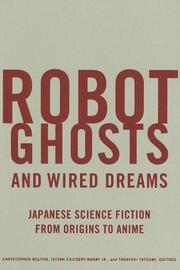
ISBN: 9780816649730 0816649731 9780816649747 081664974X Year: 2007 Publisher: Minneapolis, Minn. University of Minnesota Press
Abstract | Keywords | Export | Availability | Bookmark
 Loading...
Loading...Choose an application
- Reference Manager
- EndNote
- RefWorks (Direct export to RefWorks)
Since the end of the Second World War--and particularly over the last decade--Japanese science fiction has strongly influenced global popular culture. Unlike American and British science fiction, its most popular examples have been visual--from Gojira' (Godzilla)' and Astro Boy' in the 1950s and 1960s to the anime masterpieces Akira' and Ghost in the Shell' of the 1980s and 1990s--while little attention has been paid to a vibrant tradition of prose science fiction in Japan. Robot Ghosts and Wired Dreams' remedies this neglect with a rich exploration of the genre that connects prose science fiction to contemporary anime. Bringing together Western scholars and leading Japanese critics, this groundbreaking work traces the beginnings, evolution, and future direction of science fiction in Japan, its major schools and authors, cultural origins and relationship to its Western counterparts, the role of the genre in the formation of Japan's national and political identity, and its unique fan culture. Covering a remarkable range of texts--from the 1930s fantastic detective fiction of Yumeno Kyûsaku to the cross-culturally produced and marketed film and video game franchise Final Fantasy'--this book firmly establishes Japanese science fiction 'as a vital and exciting genre. Contributors: Hiroki Azuma; Hiroko Chiba, DePauw U; Naoki Chiba; William O. Gardner, Swarthmore College; Mari Kotani; Livia Monnet, U of Montreal; Miri Nakamura, Stanford U; Susan Napier, Tufts U; Sharalyn Orbaugh, U of British Columbia; Tamaki Saitô; Thomas Schnellbacher, Berlin Free U. Christopher Bolton is assistant professor of Japanese at Williams College. Istvan Csicsery-Ronay Jr. is professor of English at DePauw University. Takayuki Tatsumi is professor of English at Keio University.
Fiction --- Film --- Japan --- J6848 --- J5930 --- J5509 --- J6839 --- Science fiction, Japanese --- -Japanese science fiction --- Japanese fiction --- Japan: Media arts and entertainment -- anime --- Japan: Literature -- modern fiction and prose (1868- ) --- Japan: Literature -- theory, methodology and philosophy --- Japan: Media arts and entertainment -- cinema --- History and criticism --- History and criticism. --- -Japan: Media arts and entertainment -- anime --- Japanese science fiction
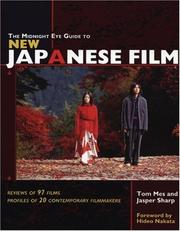
ISBN: 9781880656891 1880656892 Year: 2005 Publisher: Berkeley, Calif. Stone Bridge
Abstract | Keywords | Export | Availability | Bookmark
 Loading...
Loading...Choose an application
- Reference Manager
- EndNote
- RefWorks (Direct export to RefWorks)
An eye-opening portrait of a vibrant film culture, The Midnight Eye Guide to New Japanese Film is the most comprehensive study of the Japanese filmmaking scene yet written. Tom Mes and Jasper Sharp explore the astounding resurgence of Japanese cinema, both live action and animated, profiling 19 contemporary Japanese filmmakers, from the well-known (Kitano, Miike, Miyazaki) to the up-and-coming (Naomi Kawase, Satoshi Kon, Shinya Tsukamoto) and reviewing 97 of their recent films. With 100+ images from behind and in front of the camera, this is a book any film lover will savor. Foreword by Hideo Nakata, director of Ring.
Film --- Japan --- Motion pictures --- History --- J6839 --- J6806 --- Japan: Media arts and entertainment -- cinema --- Japan: Performing and media arts -- reference works --- History. --- Motion pictures - Japan - History
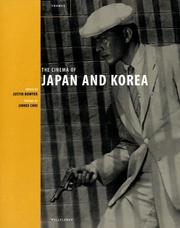
ISBN: 1904764118 1904764126 Year: 2004 Publisher: London Wallflower
Abstract | Keywords | Export | Availability | Bookmark
 Loading...
Loading...Choose an application
- Reference Manager
- EndNote
- RefWorks (Direct export to RefWorks)
Book
ISBN: 9781906876180 Year: 2010 Publisher: Leiden Global Oriental
Abstract | Keywords | Export | Availability | Bookmark
 Loading...
Loading...Choose an application
- Reference Manager
- EndNote
- RefWorks (Direct export to RefWorks)
Book
ISBN: 9781628922875 1628922877 Year: 2015 Publisher: New York Bloomsbury, An imprint of Bloombury Publishing Inc
Abstract | Keywords | Export | Availability | Bookmark
 Loading...
Loading...Choose an application
- Reference Manager
- EndNote
- RefWorks (Direct export to RefWorks)
Ozu, Yasujirō, --- Critique et interprétation --- film --- twintigste eeuw --- Ozu Yasujiro --- 791.471 OZU --- Japan --- J6839 --- Japan: Media arts and entertainment -- cinema --- Ozu, Yasujirô --- Critique et interprétation.
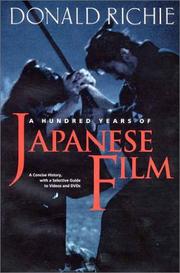
ISBN: 477002682X Year: 2001 Publisher: Tokyo Kodansha international
Abstract | Keywords | Export | Availability | Bookmark
 Loading...
Loading...Choose an application
- Reference Manager
- EndNote
- RefWorks (Direct export to RefWorks)
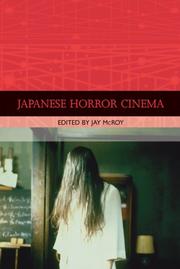
ISBN: 074861995X 0748619941 9780748619948 9780748619955 9780748619941 Year: 2009 Publisher: Edinburgh Edinburgh University Press
Abstract | Keywords | Export | Availability | Bookmark
 Loading...
Loading...Choose an application
- Reference Manager
- EndNote
- RefWorks (Direct export to RefWorks)
A critical introduction to some of the most important Japanese horror films produced over the last 50 years, this study provides an insightful examination of the tradition's most significant trends and themes.
Film --- Japan --- Horror films --- Spookfests (Motion pictures) --- Motion pictures --- Haunted house films --- Monster films --- History and criticism --- J6839 --- Japan: Media arts and entertainment -- cinema

 Search
Search Feedback
Feedback About UniCat
About UniCat  Help
Help News
News